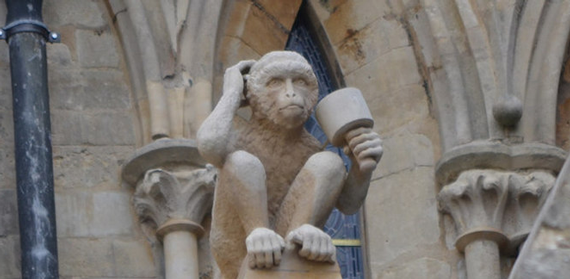Guest post Nathan Aaron Kerrigan, Centre for Research in Psychology, Behaviour & Achievement
Evolution and religion may not be at war after all. True, the two may sometimes seem like incompatible, competing worldviews: evolutionary science is regularly rejected by prominent figures with religious beliefs, and its teaching in religious schools is often controversial. And yet, many people seem to happily accommodate both. In the US, where more than nine in ten people say they believe in God, 50% believe in some form of evolution.
There’s a chance that many of these people don’t fully understand the nature of evolution as laid out by science. But most of the scientists who study the topic don’t view it in such combative terms either. The American National Academy of Science calls for a warm embrace of both religion and evolution. In a 2010 survey of evolutionary scientists, 87% of respondents said they had found some way to make religion and evolution compatible. A recent (now retracted) paper in the scientific journal PLOS One even controversially referred to human hands as a “proper design by the Creator”. How do scientists manage to reconcile these two contrasting ways of explaining our origins?
Incompatible creationism
There is a more widespread acceptance that believing in evolution and creationism is incompatible. Evolution is an idea based on scientific evidence that life developed because of random mutations in genetic material and the process of natural selection. Creationism, on the other hand, requires faith without analysis that life began due to the intervention of a supernatural creator. For this reason, there is a conflict between evolution and creationism that some people say can never be resolved.
For instance, some evolutionary scientists, including Richard Dawkins, see a world where only evolution can exist. Such evolutionists reject the premise of religion on the grounds that there is no evidence for it, instead favouring a naturalist worldview. Naturalism is the belief that only things in the natural world that can be observed and verified with evidence exist. For these scientists, evolution is the only way of explaining the origins of life, as belief in a creator requires faith and faith has no natural basis that can be subjected to experimentation.
One or the other? Shutterstock
Others have argued that this naturalist worldview can itself be seen as a kind of modern religion. For example, Philip Johnson, an advocate of the theory of intelligent design, argues that scientists often place large amounts of faith and belief into Darwin’s theory of evolution. He says that evolution easily substitutes traditional religion and provides all the benefits, such as an explanation of where we came from. But those naturalist scientists still reject the idea of evolution being compatible with religion that involves a creator God.
The dualist alternative
Other evolutionists advocate a “dualist” way of looking at the world that gives space to both religion and evolution. Instead of seeing religion as something that comes from God, these scientists see it as a human adaptation to life, where religion has developed because of evolution.
Under this perspective, religion evolved naturally as a way of promoting cooperation. Humans need to cooperate to survive and religion provides a basis for them to do so. Religion can also help shame those who try to reject their group membership in order to make them tow the line and maximise greater chances of survival for the group.
The catch is that this worldview is not actually very kind to traditional theology. It describes religion in a way that is fundamentally atheistic in character, without belief in gods, corporeal spirit or life after death. This is why evolutionary scientists with dualist beliefs don’t see a conflict between religion and evolution. They don’t hold religious beliefs in the traditional sense. Instead they use evolution to explain the existence of religion.
Ultimately, to accept evolution as scientific fact, scientists (and indeed anyone) have to abandon the tenets of religion and accept there is no higher authority on the most meaningful matters of human existence. And that is what offends most religiously-minded people.
This article was amended on 7 March 2016 to replace the phrase “prominent religious figures” with “prominent figures with relgious beliefs” to avoid confusion.
Originally written for ‘the Conversation’.





Comments are disabled